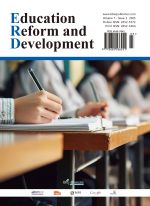Evaluating Ideological and Political Education for Public-Funded Normal Students: A Case Study of Heyuan Polytechnic’s “World Bank Loan Class” Project
Abstract
To provide education that satisfies the people, it is necessary to adapt to the new trends of high-quality education development in the new era and cultivate well-rounded and outstanding teacher candidates. The effectiveness of ideological and political education for public-funded normal students in colleges and universities is directly related to the high-level development of local basic education. Taking the “World Bank Loan Class” project at Heyuan Polytechnic as an example, this paper focuses on fundamental, current, and long-term issues, explores the educational philosophy of moral cultivation, and discusses the moral education model of “evaluation-driven learning” and “five-party co-cultivation.”
References
Shi T, 2024, From “Self-Confusion” to “Self-Consistency”: The Growth Path of Publicly Funded Normal Students in Local Universities—A Survey Study Based on a University in Shandong. Journal of Higher Continuing Education, 37(5): 1–8.
Li H, Zhang Q, 2022, From Optimizing at the “Export End” to Breaking the Mold at the “Entry End”: A Study on Local Publicly Funded Normal Student Policies. Higher Education Research, 43(10): 70–76.
Huang F, 2021, The Dispersive Structure Operation Mechanism and Path of Ideological and Political Education. Ideological and Theoretical Education, 2021(8): 62–67.
People’s Daily Theory Department, 2013, Deeply Studying the Spirit of Comrade Xi Jinping’s Series of Speeches, People’s Publishing House, Beijing.
Xu Z, 2022, Self-Knowledge in the Perspective of the Relationship Between Knowledge and Action—Analysis of Proust’s Metacognitive Theory. Communications on the Dialectics of Nature, 44(12): 48–54.
Yuan X, Li T, 2022, Research on the Hot Topics and Future Prospects of the Effectiveness of Ideological and Political Education for College Students. Educational Theory and Practice, 42(18): 28–32.
Shi W, Qin R, 2023, On Several Fundamental Issues of Evaluation of the Effectiveness of Ideological and Political Education. Journal of Ideological and Theoretical Education, 2023(8): 141–147.

